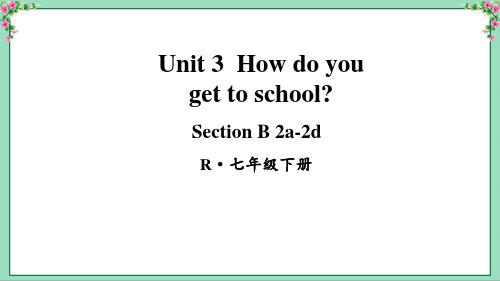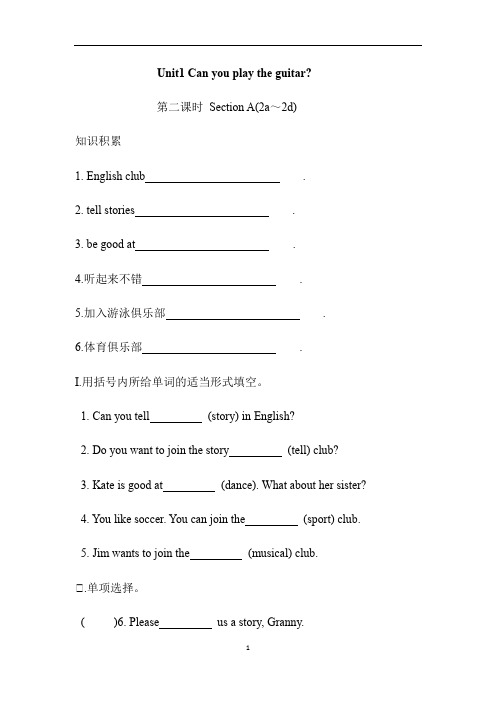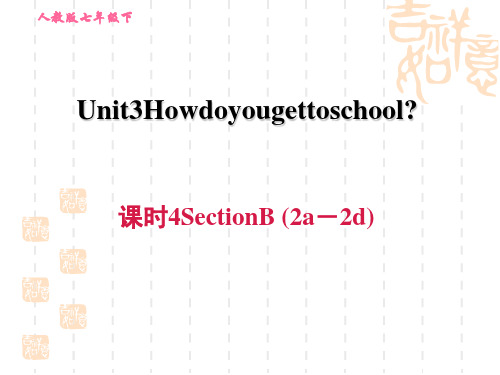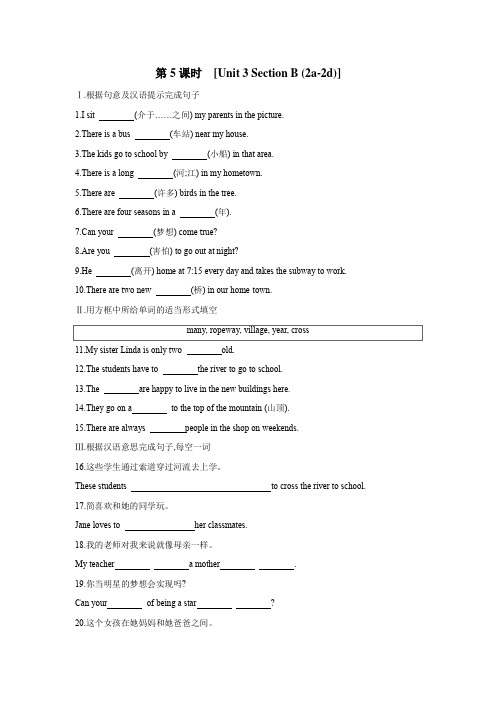人教英语七年级下册2a-2d
人教版英语七年级下册Unit 3 Section B(2a-2d)新版课件

Tips: First understand the questions, then find the answers in the text.
Read Para. 2 & Para. 3 and fill in the blanks.
to understand the general idea of the passage.
Look at the layout(布局)of the story and answer.
➢Where can you see the story? A. In a newspaper. B. In a magazine. C. In a book.
Careful-reading
Read Para. 1 and judge the sentences “T” or “F”.
T 1. For many students, it’s not hard to get to school. F 2. For the students in one small village in China, it’s
Tips: Sometimes, we can judge the type of article by its layout.
Fast-reading
Read the news story from some years 2b ago and choose the best title for it.
Learn to guess the main idea of the passage and talk about how to get to places.
七年级-人教版-英语-下册-[学习任务单]Unit-3-Section-B-(2a-2d)
![七年级-人教版-英语-下册-[学习任务单]Unit-3-Section-B-(2a-2d)](https://img.taocdn.com/s3/m/b5224a472e60ddccda38376baf1ffc4ffe47e286.png)
Unit 3 How do you get to school? (Period 4)Section B (2a-2d)班级_________ 姓名_________学习目标学完这一课,你能够掌握:1.词汇:cross、river、many、village、between、between … and …、bridge、boat、ropeway、year、afraid、like、villager、leave、dream、true、come true;2.能力:预测语篇信息;获取细节信息;3.交际功能:通过阅读,在新的语境中运用how引导的特殊疑问句及话题词汇谈论上学的交通方式。
巩固目标语言。
课前学习任务【学习任务一】词汇检测。
1.v. __________ 横过;越过2.n. __________ 河;江3.adj. & pron. __________ 许多4.n. __________ 村庄;村镇5.prep. __________ 介于……之间6.__________ 在……和……之间7.n. __________ 桥8.n. __________ 小船9.n. __________ 索道10.n. __________ 年;岁11.adj. __________ 害怕;畏惧12.prep. __________ 像;怎么样13.n. __________ 村民14.v. __________ 离开;留下15.n./v. __________ 梦想;睡梦/做梦16.adj. __________ 真的;符合事实的17.__________ 实现;成为现实【学习任务二】课前搜集一些关于偏远地区孩子上学的视频或图片,了解他们上学的方式。
课堂学习任务【学习任务一】话题词汇复习。
1.从下列字母中找出交通工具名词,并写下来。
Lakshipqeplanewocardcboatzcsubwayaebusndktaxijdmotorbiketrtrainakbike_________________________________________________________________________ 2.看图,写出“乘坐某种交通工具”的动词搭配。
人教版七年级下册英语 Unit1 Section A (2a-2d) 课时作业(含答案)

Unit1 Can you play the guitar?第二课时Section A(2a~2d)知识积累1. English club .2. tell stories .3. be good at .4.听起来不错.5.加入游泳俱乐部.6.体育俱乐部.I.用括号内所给单词的适当形式填空。
1. Can you tell (story) in English?2. Do you want to join the story (tell) club?3. Kate is good at (dance). What about her sister?4. You like soccer. You can join the (sport) club.5. Jim wants to join the (musical) club.Ⅱ.单项选择。
( )6. Please us a story, Granny.A. speakB. tellC.sayD. talk( )7. Jim likes playing chess. So he wants a sports club.A. to joinB. joinsC. joiningD. join( )8. I want to tell something my best friend.A.inB. forC. onD. to( )9. He can play .And he can play ,too. A. basketball; the chess B. a basketball; guitarC. the basketball; chessD. basketball; the guitar( )10.-?-He can sing and dance.A. What can he doB. Does he like musicC. Can he come here this afternoonD. Where does he sing and danceⅡ.根据汉语意思完成句子,每空一词。
人教版七年级下册英语Unit 3 课时4 Section B (2a-2d)

A. theschoolisveryfar
B【. 点M拨ark】isy根ou据ng原文中句子ButMomandDaddon’tallow C(.允th许esc)hhoiomlitsovdeorysnoevaerryoftenbecauseheisnotoldenough.可 D知. th答ew案e。ekdaysarenice
【点拨】原句:①InAmerica, moststudentsgotoschoolbyschoolbus.
29题简略回答问题;
29.
Whydon’tmoststudentsinAmericaliketotakethesubwayt
【点o拨sc】ho根ol?据原文中句子 _M__o_Bs_te_sc_tua_ud_se_en_tt_hs_ed_ro_ena_’r_tel_it_ko_eo_tmo_t_aa_nk_ye_pt_he_oe_spu_leb_o_wn_at_hy_…e_s_uM_b_aw_na_yy_sa_un_bdwi ay _s_t_a_tt_i'os_n_so_at_cr_oe_vn_ev_re_yn_fia_ern_f_tr._o_m_t_h_e_s_c_h_o_o_l._______________ Sothesubwayisnotconvenientforstudents.可知答案。
一、根据句意及汉语提示完成单词。 1. Thebus_________(离开)
leaves thestationatabout6:30everyday. 2. Thekidsgotoschoolby_________(小船)inthatarea. 3. Thereisalong_________(河bo;at江)inmyhometown. 4. Thereare_________(许多)birdsinthetree.
新目标(人教)七年级下册英语教学课件 Unit 12 Section A(2a-2d)

/ˈbʌtə(r)flaɪ/ n. 蝴蝶
Lisa: Yeah, it was fun. They have a butterfly house with over 200
visitor /ˈvɪzɪtə(r)/ n. 游客;参观者
kinds of butterflies! I told the visitors about them and their
A: Hi, Mike. What did you do last weekend? B: I watched TV, and then I went fishing
with my father. A: How was your last weekend? B: It was boring.
Names
【用法详解】 sheep是可数名词,意为“羊;绵羊”,其复数形式仍然是sheep。 ➢Sheep are eating grass in the fields. 羊在田野里吃草。
单复数同形的可数名词: 中日鱼羊鹿,是单也是复。
(注:中 — Chinese 日—Japanese 鱼—fish 羊—sheep 鹿—deer)
Listen again and fill in the chart.
Who Becky Carol Jack
Weekend activities visited her grandma, did her homework stayed at home, studied for the English test
Read the sentences in 2a and say the original forms of verbs.
1. ___ I visited my (aunt/ grandma). visit 2. ___ I did (my homework/ sports). do 3. ___ I studied for the (English/ math) test. study 4. ___ I went to a (farm/ beach). go 5. ___ I fed some (sheep/cows). feed
人教版七年级英语下册教学课件《Unit-1-Section-A-2a-2d》

如: Tom wants to join the army(军队). 汤姆想参军。
We want to go to a movie. Do you want to join us? 我们想去看电影,你和我们一起去吗?
辨析:join & take part in
1. join v. 参加;加入;作……成员 join + 团体/组织,表示成为……的一员
3. You are very good at telling stories. 你很擅长讲故事。 be good at sth./doing sth. … 表示“擅长 于 ……;精通 ……”,后面可接名词或动 词的ing形式。例如: Mr. Li is good at languages. He can speak eight languages. 李先生精通多种语言,他会说八种语言。
Name What can do
Clubs
Bob play soccer
a sports club
Jane
tell stories draw
the story telling club the art club
Jane: Hi, Bob. What _c_l_u_b_ do you want to join?
_s_t_o_r_i_e_s_ (story/stories) to us.
5. — You can join the chess club. — _S__o_u_n_d_s__ (Sounds/Sound) good.
6. Linda can’t play volleyball, _b_u_t_ (and/but) she can play soccer.
Mary likes … She can … She wants to …
人教版七年级下英语说课稿《Unit 4 Period2 Section A (2a-2d)》

人教版七年级下英语说课稿《Unit 4 Period2 Section A (2a-2d)》一. 教材分析人教版七年级下英语教材《Unit 4 Period2 Section A (2a-2d)》主要讲述了日常生活中的动词短语以及如何运用它们进行交流。
本节课的主要内容是学习动词短语“go shopping”, “play sports”, “visit friends”, “watch movies”等,并能够运用这些短语进行简单的对话。
通过对这些动词短语的学习,学生可以更好地掌握日常交流的表达方式,提高他们的口语能力。
二. 学情分析七年级的学生已经具备了一定的英语基础,能够进行简单的口语交流。
但他们在使用动词短语时,常常出现搭配错误和时态错误。
因此,在教学过程中,需要注重引导学生正确使用动词短语,并加强对他们听说能力的培养。
三. 说教学目标1.知识目标:学生能够掌握动词短语“go shopping”, “play sports”, “visitfriends”, “watch movies”等,并了解它们的意思和用法。
2.能力目标:学生能够运用所学的动词短语进行简单的对话,提高他们的口语表达能力。
3.情感目标:通过学习本节课的内容,学生能够激发对日常生活的兴趣,增强对英语学习的热情。
四. 说教学重难点1.重点:学生能够正确使用动词短语进行交流。
2.难点:学生能够灵活运用动词短语在不同场景中进行对话。
五. 说教学方法与手段本节课采用任务型教学法,通过情景模拟、小组讨论、游戏等活动,激发学生的学习兴趣,提高他们的参与度。
同时,利用多媒体课件和实物教具,帮助学生更好地理解和记忆动词短语。
六. 说教学过程1.导入:通过播放一段日常生活的视频,引导学生关注动词短语在日常交流中的重要性。
2.呈现:教师展示动词短语“go shopping”, “play sports”, “visit friends”,“watch movies”等,并用实物或图片进行辅助教学。
人教版英语七年级下册课时培优练:Unit 3 Section B (2a-2d)

第5课时[Unit 3 Section B (2a-2d)]Ⅰ.根据句意及汉语提示完成句子1.I sit (介于……之间) my parents in the picture.2.There is a bus (车站) near my house.3.The kids go to school by (小船) in that area.4.There is a long (河;江) in my hometown.5.There are (许多) birds in the tree.6.There are four seasons in a (年).7.Can your (梦想) come true?8.Are you (害怕) to go out at night?9.He (离开) home at 7:15 every day and takes the subway to work.10.There are two new (桥) in our home-town.Ⅱ.用方框中所给单词的适当形式填空11.My sister Linda is only two old.12.The students have to the river to go to school.13.The are happy to live in the new buildings here.14.They go on a to the top of the mountain (山顶).15.There are always people in the shop on weekends.Ⅲ.根据汉语意思完成句子,每空一词16.这些学生通过索道穿过河流去上学。
These students to cross the river to school.17.简喜欢和她的同学玩。
Jane loves to her classmates.18.我的老师对我来说就像母亲一样。
- 1、下载文档前请自行甄别文档内容的完整性,平台不提供额外的编辑、内容补充、找答案等附加服务。
- 2、"仅部分预览"的文档,不可在线预览部分如存在完整性等问题,可反馈申请退款(可完整预览的文档不适用该条件!)。
- 3、如文档侵犯您的权益,请联系客服反馈,我们会尽快为您处理(人工客服工作时间:9:00-18:30)。
show us around the farm
• 1、上个周末/六last weekend/last Saturday • 2、上个周/月/上个la周st一week/month/ Monday • 3、去年/去年夏天/去年暑假 last year/last summer/last summer vacation
• 3做家庭作业 • 4去游泳 • 5去划船 • 6去钓鱼
do one’s homework go swimming go boating go fishing
• 7去购物
go shopping
• 8去野营
go camping
• 9去跳舞
go dancing
• 1去电影院 go to the cinema/movies
Presentation
beach海滩
lake湖
camp V 扎营 badminton 羽毛球
sheep绵羊 sheep
butterfly蝴蝶 butterflies
visitor參观者 visitors
mouse老鼠 mice
baby婴儿 babies
tired
stay up late 深夜不睡,熬夜
Exercise
1.昨天他做了什么事情? _W__h_a_t __d_id_ he do yesterday? 2.上个周末她参观了什么地方? _W__h_e_r_e_d__id_ she _v_i_s_it_ last weekend? 3.你和谁一起去的动物园? _W__h_o__d_id_ you go to the zoo __w_i_th_? 4.他们什么时候到达北京的? _W__h_e_n__d_id_ they arrive in Beijing?
History Museum. Paul: Really? H__o_w__in__te_r_e_s_ti_n_g_!
Lisa: Yeah, it was fun. They have a b_u_t_t_e_rf_l_y_h_o_u_s_ewith over 200 kinds of butterflies! I told _t_h_e_v_i_s_it_o_r_s_ about them and their l_iv_i_n_g__h_a_b_it_s. Did you _h_a_v_e_a__g_o_o_d_w__e_e_k_e_n_d?
_W__h_o _st_a_y_e_d _u_p__ l_a_t_e__to__w__at_c_h__TV?
3. They were in the supermarket last Sunday.
_W__h_e_r_e_w__e_r_e_ they last Sunday?
4. My last weekend was kind of boring.
What did they do? They went to the beach.
What did they do? They went fishing.
Listen and underline
2a
the words you hear.
1. I visited my (aunt /_g_r_a_n_d_m__a). 2. I did my (h__o_m_e_w__o_rk_ / sports). 3. I studied for the (_E_n_g_l_is_h_/ math) test. 4. I went to a (_fa_r_m__/ beach). 5. I fed some (sheep /_c_o_w_s_).
What do you usually do on weekend?
watch TV
What did you do
last weekend?
上个周末
/t/
watched TV
play soccer
visit my parents
/d/
played soccer
/id/
visited my parents
What did you do last weekend? 上个周末
I p_l_ay_e_d_(play) computer games.
I c_l_e_an_e_d__ (clean) my room.
What did you do last weekend?
camped by the lake 湖边露营
A: Who visited her grandma? B:Becky did.
A: What did Carol do ? B: She studied for the English test.
A: Where did Jack go last weekend? B: He went to a farm.
[kæ mpt]
[leɪk]
What did he do? He played badminton.
What did he do? He went boating.
What did he do last weekend? He did his homework.
What did he do? He went to the cinema.
• 2去北京
go to Beijing
• 3去海滩
go to the beach
▪ 4去自然博物馆 go to the Natural Museum • 5去上学/上班 go to school/work
• 6回家
go home
• 7去乡村 go to the countryside
• 8去农场
go to the farm
2c Student A asks questions with who, what or where and Student B answers.
Then change roles.
Example
B
J
visited my grandma went to a farm
C
J
英语
fed some cows studied for the English test
• 4、在星期六的上午/下午/傍晚/晚上 on Saturday morning/afternoon/evening/night
• 5、在星期日的上午/下午/傍晚/晚上 on Sunday morning/afternoon/evening/night
• 6、 在上午/下午/傍晚/晚上 in the morning/afternoon/evening at night
Read the conversation and answer
2d
the questions.
1. How was Lisa’s weekend? _It__w_a_s_g_r_e_a_t_. ___________
2. Where did Lisa work as a guide? _A_t_t_h_e__N_a_t_u_r_a_l _H_i_s_to_r_y__M__u_se_u_m__._
Listen again. Write C for Carol, J for
2b
Jack or B for Becky next to the statements in 2a.
1. __B_ I visited my grandma. 2. _B__ I did my homework. 3. _C__ I studied for the English test. 4. _J__ I went to a farm. 5. _J__ I fed some cows.
2d Role-play the conversation.
Paul: Hi, Lisa. How was your weekend? Lisa: _G_r_e_a_t__, thanks. Paul: What did you do? Lisa: I _w_o_r_k_e_d__a_s a guide at the Natural
• 9去一个小山村 go to a small village
• 10去图书馆
go to the library
• 1在湖边/在河边 by the lake/river
• 2在湖边扎营
camp by the lake
• 3打羽毛球/篮球 play badminton/basketball
• 4看望爷爷奶奶 visit grandparents
3. What did she do there? _S_h_e_t_o_l_d_t_h_e_v_i_s_it_o_r_s_a_b_o_u_t_t_h_e____ _b_u_t_te_r_f_li_e_s_a_n_d__th__ei_r_l_iv_i_n_g__h_a_b_it_s_.
4. Why is Paul tired now? B__e_c_a_u_se__h_e_s_t_a_y_e_d_u_p__l_a_te__to__w_a_t_c_h t_h_e__so_c_c_e_r_g_a_m__e_._______________
Paul: Yeah, it was good, bБайду номын сангаасt I’m kind of _t_ir_e_d__ now. I _s_ta_y_e_d__u_p__la_t_e to watch the soccer game.
• 1 一只绵羊 • 2两只绵羊 • 3一只老鼠 • 4 三只老鼠 • 5一只蝴蝶 • 6四只蝴蝶 • 7一个婴儿 • 8五个婴儿 • 9参观.参观者
a sheep two sheep a mouse three mice
a butterfly four butterflies
